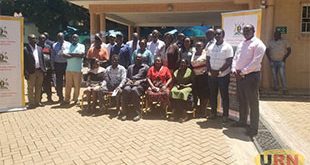
By Agnes Asiimwe
Wasula runs Afrigo Band as a business
How did you end up in entertainment?
I was a fan of the Cranes Band, and Moses Matovu who was the band leader, is a first cousin. When the Cranes collapsed Moses, Sam Tamale, Omar Matta, and I pooled resources and started Afrigo Band in 1976.
We named the band Africa Go which eventually became Afrigo.
How have you managed to keep Afrigo Band a consistently great entertainer for 33 years?
We manage it as a business, with a board of directors. Why other groups come and go is because they are run as entertainment groups, and when you do that it means that if four star performers leave the group then it will collapse. But as a business, it will remain.
It’s not about a personality, it’s not a one-man show, its Afrigo – it’s a company. We take our time with each album. It takes us 2-3 years to complete an album.
Big defections and huge egos break many music groups, how has Afrigo survived?
Around 1986, most of them left and we were left with Moses Matovu, and a few others. Because of the strong foundation, it took us two weeks to regroup, we recruited new musicians and we were back on the road.
Those fellows who left started coming back one by one.
What are your guiding principles in management?
Division of labour and delegation amongst us the four directors, we share responsibilities. The day to day administration is handed down to Moses who is the music director.
He does the recruitment and the administration but occasionally consults the board. With delegation comes transparency.
| Wasula’s tips to successful business management? Division of labour Delegation amongst us the four directors, we share responsibilities. The day to day administration is handed down to Moses who is the music director. He does the recruitment and the administration but occasionally consults the board. With delegation comes transparency. |
What challenges do you face managing a music group?
It’s not easy to sustain a standard. We have to keep playing good music all the time.
Getting the musicians to appreciate that what they are doing is a job, not fun. There was a time when local music was not appealing to the society and we had to imitate other people’s music. That was until we were challenged by the late (Congolese Musician Luambo Makiadi) Franco. He came here and we played with him and he wondered how we had perfected his music but did not have our own. We told him people here did not like it and he said no, don’t be led by your fans, lead your fans. We went to work in the studio and after long practice we hit the stage and played 80% of our music. We lost all our fans and at one time we played to only three patrons but we stuck to our guns. With time it worked.
How are dealing with piracy of your music?
We are very strict. Afrigo sells its music through music publishers whom we give distribution rights. But the new musicians are materialistic; they think their music being played on the streets will make them popular. In Afrigo we don’t leak our music.
What problems do you face with Ugandans?
Every friend and relative wants complimentary tickets to enter Obbligato free. I have seen it in football too. There is a lack of appreciation for art.It’s that kind of mentality that has sustained piracy.
Where do you see Afrigo in five years?
We want to improve the equipment in our studio in Kibuli, construct our headquarters and manufacture blank CDs.
About Wasula: He has been a director of Afrigo Band since its inception in 1976. He is the general secretary of Uganda Performing Rights Society and monitors copyright compliance for music in Uganda. He writes songs, sings and plays the bass guitar.
About Afrigo: Uganda’s oldest band and the epitome of its contemporary band music. It changed the perception that only foreign music was good when they stopped imitation of Congolese music and started singing their own compositions. In the late 70s the band got so popular that then president at the time, Idi Amin, made them residents at his Cape Town Villas and on many occasions would join them with his accordion during rehearsal. Afrigo, which performs at Club Obbligato in Kampala on weekends has 22 best selling albums and has toured in many countries.
 The Independent Uganda: You get the Truth we Pay the Price
The Independent Uganda: You get the Truth we Pay the Price



